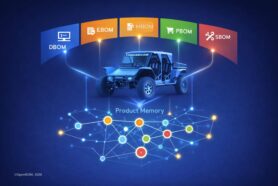
It is hard to believe, but 2022 is practically over. The remaining few days are a perfect time to reflect on what we’ve seen and learned during 2022. In this article, I want to share what I’ve learned about manufacturing companies’ realities as we’ve been growing the OpenBOM business in 2022. Just before I move forward, this is not an article about trends and the state of the market, but just an observation of what we’ve seen happens with companies as they are moving into the digital transformation of engineering and manufacturing methods. OpenBOM’s customers are small and medium-sized engineering and manufacturing companies in a variety of industries. Check more for OpenBOM customer stories and G2 reviews.
Here are my 5 observations:
Digital Transformation is On The Agenda List
It’s been a tumultuous few years for the manufacturing industry, but something good has come out of it. COVID made its contribution to help companies to decide they need to start moving into a digital world. The number of companies and engineers that believe that they can live with files on local disks and manage Excel files is massively going down. Companies told us that digital transformation is one of the most important strategies that manufacturers are using to streamline their processes, increase efficiency, ensure sustainability and remain profitable in 2023 and beyond—but how to do so is remaining one big question for many companies.
Managing data is remaining one big challenge for manufacturing companies and engineers involved in the design, production planning, manufacturing, and procurement activities. This is where OpenBOM was helping our customers. What became clear to us is the desire of companies “to figure this out”, which is one big positive sign.
It is Not About Digital Paper (Files)
Files and folders are still one of the strongest data organization paradigms. No matter what software does, companies are looking at how to organize the data and process in files and folders. Companies think that they have gone digital when all they’ve done is pick up their existing “file” based processes and put them in some sort of computing system. It can automate some of the processes, but it is not a digital transformation, yet.
Administration, Collaboration, Role Planning, and Data Sharing
When planning digital processes, you need to think about role planning and data access. Not everyone should be an administrator. It is important to decide how your company users, contractors, and suppliers will access data in a granular way. The first thing to think about is ‘data’ and not ‘documents’. Once the switch from “export a file” to “sharing the data” has been done only then the true digital transformation starts.
Just Automate What We Have
Everyone wants to be faster, cheaper, and easier. We love this as well, therefore we automated many processes of data extraction mechanisms to create data, pack it in the right format, and form and combine data together. At the same time, “just moving data into Excel (or PDF) file because we always did it” is not the right goal for digital transformation. Those companies thinking that the paper process of yesterday is equal to the digital process of tomorrow should be ready for a failure in digital transformation process.
Focus On Individual Systems and Not on Information Flow
It is super dangerous to think about what each individual system was able to do before and not look at the bigger picture of data flow. If you store some data in a CAD system before, it doesn’t mean that this data should be there in the future. If you were keeping an Excel for a BOM, it doesn’t mean you need to keep doing these Excels automatically and store them in Google Drive just because it will keep your current process. Establishing an entire information flow is more important than trying to keep existing data silos.
Where Is The Button To Get All My Data In?
It is extremely important to get an appropriate resource to make the transformation happen. There is no magic button to “make it work”. Companies that allocate resources to analyze their existing data, clean it, plan new processes, and set up a new digital environment will win. The companies that think they can just dump all their files and Excels in and hope for good will not make it. Remember – “garbage in, garbage out”…
Conclusion:
I think engineers and everyone in the manufacturing industry understand the importance of digital transformation and how it can help companies to improve the way they work. Companies are looking at how to become more sustainable, and profitable, to scale up their business. The aim of digital transformation is to make these goals and not how move from paper files to digital files. While looking at how to move to new technologies, and cloud software, simplify processes, and get rid of old papers, Excel, and Emails, it is important to think about new digital processes first. Therefore, education, resource allocation, and best practices are very important things to start with.
At OpenBOM we developed a unique onboarding process that helps manufacturing companies embark on new digital transformation processes to transform the way they work and focus on how to make the right decisions for their businesses.
REGISTER FOR FREE to check how OpenBOM can help you today.
Best, Oleg
Join our newsletter to receive a weekly portion of news, articles, and tips about OpenBOM and our community.










